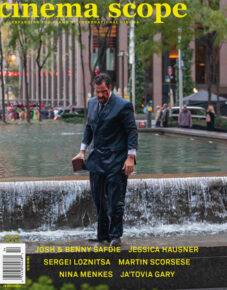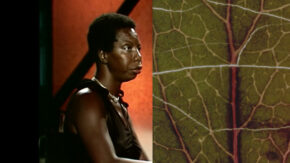CS81
Cinema Scope 81 Table of Contents
By Cinema Scope | 12/29/2019 | CS81, From Cinema Scope Magazine, Table of Contents
Interviews Anything Is Possible: Josh and Benny Safdie on Uncut Gems by Adam Nayman A Concept of Reality: Sergei Loznitsa’s State Funeral by Daniel Kasman Fairytales and Freudian Females: A Conversation with Jessica Hausner by Jordan Cronk Features They Are All Equal Now: The Irishman’s Epic of Sadness by Robert Koehler I Shall Be Released: Amazing…
Read More → Anything Is Possible: Josh and Benny Safdie on Uncut Gems
By Adam Nayman | 12/29/2019 | CS81, From Cinema Scope Magazine, Interviews
At this point, the Safdies are young masters of their own aesthetic, which was in formation at the time of Daddy Longlegs but felt more fully realized in Heaven Knows What:a roving, probing, pulsating audiovisual weave that doesn’t so much privilege pace over clarity as locate one in the other. Their movies can be exhausting, enervating, and even annoying (and Sandler, to his credit, achieves genuine annoyance in many passages here), but they’re never confusing, and the lucidity of their storytelling—which never wavers even when their characters have no earthly idea what they’re doing—has become one of contemporary American cinema’s true and distinctive marvels.
Read More → They Are All Equal Now: The Irishman’s Epic of Sadness
By Robert Koehler | 12/29/2019 | CS81, Features, From Cinema Scope Magazine
Since cinema is moving toward television, and since the MCU generation is trying to actually tussle with a good fella like Martin Scorsese, and since all of this is wrapped around a cultural moment steeped in glorious contradictions, the timing of The Irishman couldn’t be more perfect.
Read More → Far from Paradise: Nina Menkes’ Queen of Diamonds
By Erika Balsom | 12/29/2019 | CS81, Features, From Cinema Scope Magazine
By Erika Balsom Diamonds are sharp and hard, rich in myth and violence, soaked in desire, totally under the putrid spell of money. They are, in other words, a lot like Las Vegas—especially as it appears in Nina Menkes’ searing 1991 film Queen of Diamonds. Across 75 taut minutes, Sin City’s fabulous hedonism recedes from…
Read More → Garden Against the Machine: Ja’Tovia Gary’s The Giverny Document
By Michael Sicinski | 12/29/2019 | CS81, Features, From Cinema Scope Magazine
By Michael Sicinski Ja’Tovia Gary’s filmmaking is all to some extent grappling with the question of identity, particularly its precariousness in an often hostile world. Early films such as Cakes Da Killa: No Homo (2013) and An Ecstatic Experience (2015) explore the complex histories of African-American life, in particular the role of art and storytelling…
Read More → Collective (Alexander Nanau, Romania/Luxembourg)
By Jay Kuehner | 12/29/2019 | CS81, From Cinema Scope Magazine, Spotlight
By Jay Kuehner As the opening credits of Alexander Nanau’s Collective rolled at a screening at TIFF, a fellow critic leaned to me and whispered, in a mantra-like tone, the name of an indelible Chinese documentary: Karamay. The implied message was tacitly understood: that Xu Xin’s colossal 2010 work on the aftermath of the eponymous…
Read More → Ne croyez surtout pas que je hurle (Frank Beauvais, France)
By James Lattimer | 12/29/2019 | CS81, From Cinema Scope Magazine, Spotlight
By James Lattimer For a film that reveals its formal conceit from the outset and never deviates, Ne croyez surtout pas que je hurle is remarkably complicated. Frank Beauvais’ first feature-length work opens with a simple intertitle, stating that he watched over 400 films between April and October 2016 and that the footage to be…
Read More → The Twentieth Century (Matthew Rankin, Canada)
By Josh Cabrita | 12/29/2019 | CS81, From Cinema Scope Magazine, Spotlight
By Josh Cabrita William Lyon Mackenzie King, Canada’s tenth and longest-serving prime minister, is an emblem of our nation’s repressed, ineffectual masculinity. A staunch centrist and bureaucrat, Mackenzie King accomplished little during his 22 years in office: his main contributions were his ability to win elections despite his apparent lack of charisma, and his power…
Read More → Cinema Scope 81: Editor’s Note
By Mark Peranson | 12/29/2019 | Columns, CS81, From Cinema Scope Magazine
By Mark Peranson Let’s call this one “Notes Towards an Editor’s Note.” I know that some of you think I’m funny like a clown and I’m here to amuse you, so I hate to disappoint those fair readers looking for the usual belly laugh or two in this quarterly missive. But to be totally honest…
Read More → Global Discoveries on DVD: Women, Men, Progressive and “Progressive” Thinking
By Jonathan Rosenbaum | 12/29/2019 | Columns, CS81, DVD Reviews, From Cinema Scope Magazine
By Jonathan Rosenbaum Some of Roman Polanski’s early features—Repulsion (1965), Rosemary’s Baby (1968), and Tess (1979)—are centred on vulnerable women, but as Bitter Moon (1992) makes abundantly clear, these are all films predicated on the male gaze, as are the more recent and more impersonal films of his that come closest to qualifying as Oscar…
Read More → Exploded View | Peter Emanuel Goldman’s Pestilent City
By Chuck Stephens | 12/29/2019 | Columns, CS81, Exploded View, From Cinema Scope Magazine
By Chuck Stephens Structurally ambiguous and romantically rancid, Peter Emanuel Goldman’s 1965 Pestilent City is a 15-minute, high-contrast black-and-white New York City scherzo of sleaze, dereliction, working stiffs, stumblebums, loitering, malingering, playing, and passing out, filmed in Times Square and along the Deuce during the area’s deleterious decline, halfway between Sweet Smell of Success (1957)…
Read More → Jojo Rabbit (Taika Watiti, US)
By Angelo Muredda | 12/28/2019 | CS81, Currency, From Cinema Scope Magazine
By Angelo Muredda “Don’t get into the Nazi stuff,” Taika Waititi’s deadbeat dad tells his son, the eponymous protagonist of the New Zealand-born actor-writer-director’s sophomore feature Boy (2010), gesturing to a swastika he once carved into the wall of his childhood bedroom, the remnant of a reformed punk’s youthful exploits. Hindsight being 20/20, it’s almost…
Read More → Portrait de la jeune fille en feu (Céline Sciamma, France)
By Chloe Lizotte | 12/28/2019 | CS81, Currency, From Cinema Scope Magazine
By Chloe Lizotte The very title of Portrait de la jeune fille en feu seeks to pin down the unpinnable: to fix a flame in place. Céline Sciamma’s 18th-century romance centres on the innate slipperiness of condensing someone’s presence into oil on canvas, a process in which the act of rendering becomes an intimate exchange…
Read More → Invisible Life (Karim Aïnouz, Brazil)
By Katherine Connell | 12/28/2019 | CS81, Currency, Web Only
By Katherine Connell Chronicling the life of the legendary Rio de Janeiro drag performer, hustler, and street fighter, Madame Satã (2002) announced Karim Aïnouz as a filmmaker attuned to the conceptual richness and subversive potential found within liminal spaces: individuals who fluctuate between seemingly fixed identity categories, and whose fullness of life outside the social…
Read More → 















